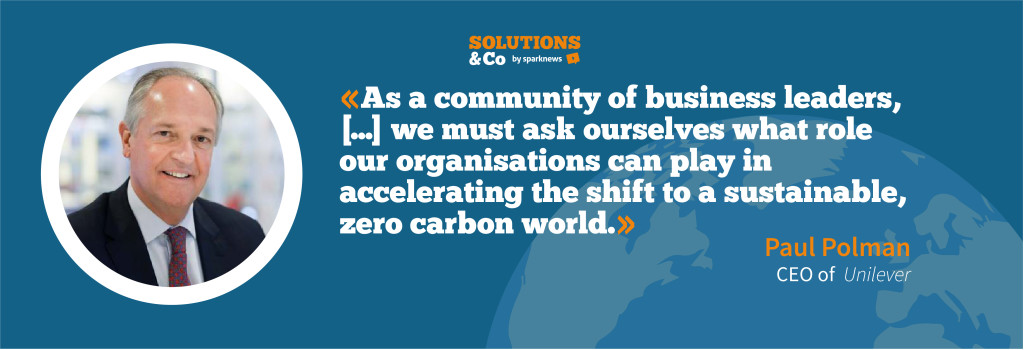Accelerate
Solutions&Co encourages meetings and exchanges between the leaders of innovative solutions and larger-scale companies, with the aim of creating synergies and strengthening the impact of these positive initiatives.
Solutions&Co encourages meetings and exchanges between the leaders of innovative solutions and larger-scale companies, with the aim of creating synergies and strengthening the impact of these positive initiatives.

Last November 11, we remembered the sacrifices of those people who, one hundred years ago, selflessly gave their lives fighting during World War I to protect our freedoms and our way of life. I sometimes wonder what those brave men and women would make of our situation today. We face different threats to global peace and security, yet not all of them carry guns.
In fact, climate change now poses a greater threat to our way of life than many of the military threats of the 20 th century. While few dispute this, the mobilisation of likeminded leaders determined to stop it in its tracks is not yet where it needs to be.
Don’t get me wrong – we’ve made a good start. Following the adoption of the UN Sustainable Development Goals and the historic Paris Agreement on Climate Change, we’ve seen commitments to action from every sector of the economy and every part of the globe — almost 500 major businesses have set Science Based Targets to reduce emissions in line with the Paris Agreement. Nearly 400 investors with USD 32 trillion of assets under management have committed to work towards the low carbon transformation. More than 100 indigenous groups, local governments, and businesses launched a forest, food and land-focused coalition aiming to deliver 30 percent of the total emissions reduction the world needs by 2030.
But considered alongside the scale of the challenge, they are little more than proof that things could change, not a guarantee that they will. Success requires all of us to go ‘All In’, the subject of a new book from David Grayson, Chris Coulter and Mark Lee. The book argues that not only do we need to reorient our businesses to serve humanity’s fundamental needs, while respecting planetary boundaries, we also need to make advocacy for transformational change a part of our everyday activities as business leaders.
Why is this? Because system inertia means that on the current trajectory, the necessary and inevitable transformation will come too slowly to prevent disaster. While an accelerated transition is essential to our shared prosperity, the public policy changes necessary to achieve it are of a magnitude never before seen during peacetime. What’s more, this time we need the world to mobilise against an invisible threat. It will be harder. It will require all of us. And this time, for this fight, there can be no sitting on the side-lines.
On the one hand, we have the latest science from the UN’s Intergovernmental Panel on Climate Change putting in stark relief the impacts we face even at the lower ambition goal of limiting temperatures to 2 degrees Celsius above preindustrial levels.
On the other hand, economic data from groups such as The Global Commission on the Economy and Climate make clear this is the only rational path to take. Even conservative estimates put global economic uplift from a radical low carbon shift at around USD 26 trillion by 2030, and that’s without counting the 700,000 premature deaths it would prevent from air pollution or the 65 million jobs it would create.
Faced with these facts, it can no longer be morally —or economically— acceptable to consider whether it’s worth engaging. The only question is: “how?”
We need a battle plan on multiple fronts. We need to help society become more resilient to the changes already locked in — whether rising water scarcity or vulnerability to extreme weather events. At the same time, we need to attack the underlying causes of our changing climate, from an economy built on fossil fuel extraction to a financial system that discounts the value of future generations too heavily over those alive today.
As a community of business leaders, we must stand shoulder to shoulder. We must ask ourselves what role our organisations can play in accelerating the shift to a sustainable, zero carbon world.
Some things, such as applying carbon pricing in capital expenditure decision making, switching to 100 percent renewable energy and ending deforestation in supply chains, are straightforward. But we must go further. We must engage directly with policy makers — not as lobbyists for our organisations’ self-interested short-term gain, but to help co-create the frameworks that will enable the transformation to take place and society to benefit from it. Without this collective effort, none of us can succeed.
A century ago, many millions of people understood this dynamic. Seeing the collective threat, they put the interests of others first, fought together to change the course of history and create a better world for all. It’s now our turn to do it again.
Nous utilisons des cookies pour optimiser votre expérience en ligne. En poursuivant votre navigation sur ce site, vous acceptez l’utilisation de ces cookies. Plus d'informations
Accepter les cookies vous assurent une navigation optimale sur le site. Si vous continuez de naviguer sur ce site sans changer les paramètres des cookies ou en cliquant sur "j'accepte" vous consentez à leur utilisation.